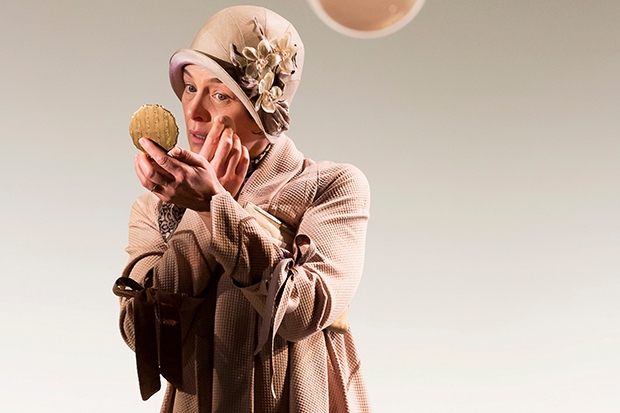Wallace Shawn is a lovely old sausage. A stalwart of American theatre, he’s taken cameo roles in classic movies like Clueless and Manhattan. He’s also a playwright whose new script has received its world première at the National Theatre. Lucky chap. He spent three or four years writing Evening at the Talk House and it reveals a peculiar methodology. A play normally features a central character grappling with a personal dilemma, which leads to suffering, change and self-discovery. Shawn doesn’t bother with any of that, he just lays on a gang of theatre types who spend two hours spouting cascades of circuitous chitchat. The show opens with a speech by a rich and successful American TV producer who tells us how rich and successful he is. His paragraphs of orotund superiority last 20 minutes. He recalls that a few years back he wrote a little playlet whose cast are keen to meet up and discuss the old days. A restaurant, the Talk House, is hired. Seven luvvies appear (some British, some American) for cocktails and group hugs. They then wolf down a load of canapés and exchange gossip about this show, that show and the other show.
It’s clear that Shawn has dispensed with two key dramatic instruments here: purpose and conflict. His characters have nothing to gain or lose from each other. And they have no aims to fulfil either. At the first read-through it should have been clear that this wasn’t a play but a collection of words arranged on numbered pages so as to resemble a play. But wait. Something else is going on. The characters at the Talk House refer to ‘Ackerley’, who appears to be a leader elected every three months. Has a state of emergency been declared? There are hints of violence. ‘Targetings’ are mentioned. As are ‘murders’. The characters seem anxious that the state is involved in a campaign of secret assassinations. But not that anxious. Just a bit. One of the actresses reveals that her career has nosedived and she now scrimps a living in a restaurant but she tops up her income by flying around the world to bump off foreigners. No really. That’s in the play. The government arranges for its enemies overseas to be hunted down and killed by waitresses.
At this point something new emerges from the muddle. Shawn hasn’t just created a script that lacks any dramatic tension or focus (or, incidentally, a central character), he wants to lay on a shotgun wedding between two incompatible genres. One is a self-involved navel-gazer about the acting trade. The second is a futuristic political dystopia examining the compromises forced on liberal society by terrorism. Watching this swirl of twaddle is like witnessing a drunk trying to set fire to an ice cube. How did it happen? Most theatres have a professional filter, a ‘literary manager’, who ensures that duds are rejected on arrival. If the NT is reluctant to advertise the vacancy perhaps this column can help initiate the search. Applications should be sent to a chap called Rufus Norris.
Also at the NT, a challenging play by one of the great theatrical personalities of the 20th century. Harley Granville-Barker was an innovative actor and writer who created a handful of enduring plays. Waste, alas, is not one of them. The main character, Henry Trebell, is an icily ambitious politician who has a dalliance with a dippy flapper named Amy. The affair leads to a pregnancy. Amy wants to abort the child. Henry is keen to protect his public reputation. The early scenes are excellent fun. Charles Edwards, a natural comic, brings some lightness to Henry’s calculating selfishness and Olivia Williams plays the maddening Amy as a sexy drifter unburdened by too many brain cells. But once the affair cools off so does our interest. The couple are too ill matched to catch our sympathy. Dimwit Amy is deeply frustrated by life while callous Henry is pursuing his career with laser-beam concentration.
When the play was written, in 1907, abortion was so shameful and sordid a crime that it was never spoken of in public. This gave the play a titillating veneer of novelty and transgression. Not so today. And Hildegard Bechtler’s design is deeply weird. The costumes and hairstyles belong to the right era but the stage floor has been soaked in black glossy paint like a slick of tar. It looks dangerously skiddy. The rooms are bounded by huge flats, in whites and creams, that trundle on and off stage. They’re like enormous rectangles of sliced bread. It’s quite a challenge, this show, but if you fancy three hours of moral tribulation performed inside a giant Hovis loaf sitting on an oil spillage then you’re in luck.






Comments